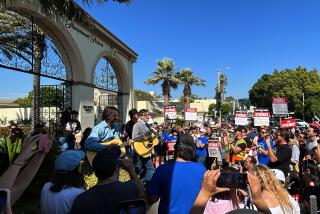Reader to Reader
- Share via
David Horne’s letter (June 11) regarding the number of tracks on CDs is flawed both factually and, in the main, in his choice of target.
First of all, the “mechanical” royalty is not 6.95 cents per track. The statutory rate (which may be negotiated down) is 7.55 cents or 1.55 cents per minute of playing time, whichever is greater. ASCAP and BMI are performing rights societies, not a form of royalties, and they have nothing to do with the sales of recordings or the number of tracks on a CD. ASCAP and BMI collect and pay royalties to publishers and composers for the public performance of their members’ musical compositions on radio and television, in concert halls, etc.
As for artists “selling out” by “bloating” their albums with tracks, this is an issue between the artist and the record company, not the consumer who pays in the aggregate no more, no less for the additional tracks. From my experience, this “business” aspect is rarely on the minds of artists when they record albums. Indeed, in many instances the mechanical royalty for excess tracks may be deducted from the artist’s royalty.
RICHARD SCHULENBERG
Los Angeles
*
Schulenberg is author of “Legal Aspects of the Music Industry: An Insider’s View” (Watson-Guptill Publications Inc.).
*
Horne is correct that many record contracts limit the amount of mechanical royalties to 10 times the rate (some more onerous agreements only agree to pay 75% of this rate) but fails to also state that any overages are taken from the artist’s royalties. Rarely, even with more successful artists, does this royalty exceed 12 times the mechanical rate.
If all the material on a CD is written by the artist, the increase in the number of songs from 10 to 15 doesn’t affect the total mechanical royalties paid to the artist, since he gets the entire amount anyway.
If the artist records songs written by others, however, this can have a dramatic effect on the artist’s ability to recoup his advances and make any additional money from record sales, since the songs written by others would get paid at the full rate while the artist’s songs would get paid at a reduced rate to meet the ceiling on royalties.
If the royalties paid to “outside” songs exceed the cap, the balance is taken from the artist’s record royalties, thereby reducing the overall amount the artist earns from the sale of each CD. For artists who don’t write their own material, this could have a severe impact on their financial ability to survive long enough to make their next CD.
STEVEN WINOGRADSKY
The Winogradsky Co.
North Hollywood
*
The two letters last Sunday in defense of rap must be taken as either pathetic or laughable (or perhaps a bit of both).
All I know is every time I’m at a stop light and hear that junk blaring from the car next to me, I want to tell them to listen to some real music. And when I’m in a record store and they’re playing rap, it’s a big relief to exit the store.
Writer Jeff Deutsch says “art is supposed to push our buttons.” Great art consists of beauty, passion and elegance. All rap does is display and incite anger--therefore it is artless.
ERIC HERNANDEZ
Los Angeles
More to Read
The biggest entertainment stories
Get our big stories about Hollywood, film, television, music, arts, culture and more right in your inbox as soon as they publish.
You may occasionally receive promotional content from the Los Angeles Times.










